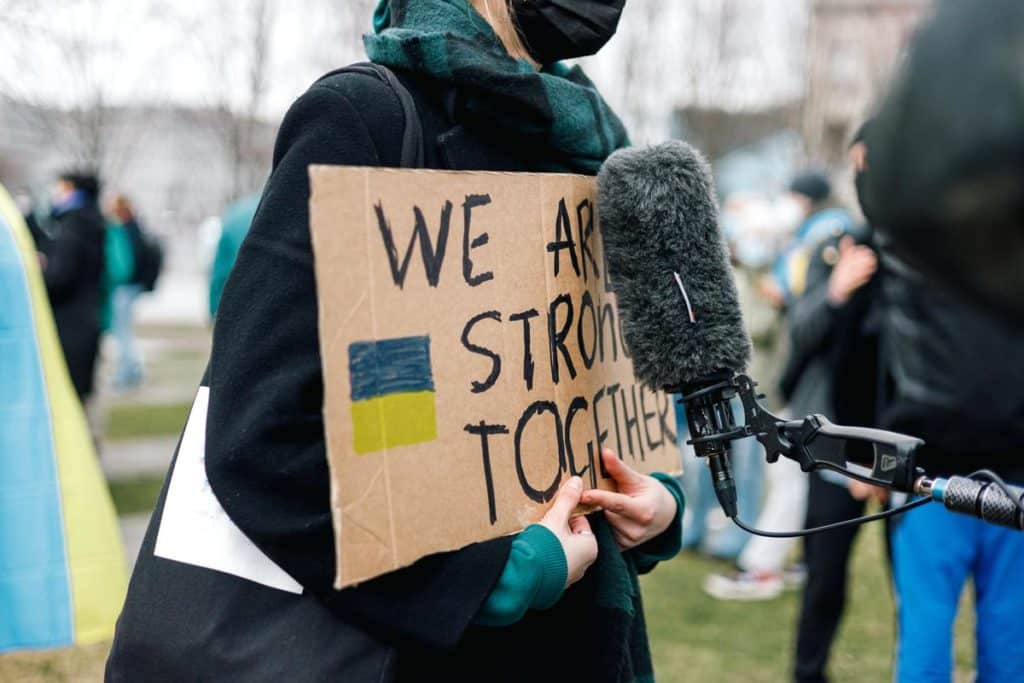Following Russia’s invasion of Ukraine, the citizens there are experiencing the devastating consequences of living in a war zone – the constant threat of shelling, shooting and losing loved ones, as well as the worry over accessing food, clean drinking water and healthcare, and the breakdown of their usual routines and structures.
The mental health impact of this is likely to have consequences for years to come.
Post‐traumatic stress disorder (PTSD) and depression are the most common mental health disorders in the aftermath of war – for both adults and children. While the incidences of these disorders are difficult to estimate, most studies have found significantly raised levels of disturbance compared with control populations. For example, past studies of newly arrived refugee children show rates of anxiety from 49 percent to 69 percent, with prevalence dramatically increasing if at least one parent had been tortured or if families were separated.
Watching the War Unfold on Social Media
People in Ukraine and around the world are watching the crisis unfold not only through traditional news sources, but also on social media via raw, personal TikTok videos, Instagram stories, and tweets. It’s not exactly the “first social media war,” as some have branded it; social media has been used to document other armed conflicts, such as the Syrian war that began in 2011. But the way wars are covered on social media has drastically changed over time. In 2011, TikTok didn’t exist and Instagram was a year old. To date, TikTok videos tagged with #ukrainewar have been viewed more than 600 million times, and almost 180,000 Instagram posts have used that hashtag.
That stream of information is powerful: it forces people to pay attention and gives them a window into the experiences of people in Ukraine. But tracking up-to-the-minute developments can come at a cost. Research suggests that news coverage of traumatic events can affect viewers’ mental health—and with footage and photos from Ukraine flooding social media and misinformation spreading rampantly, that has implications for public health.
How the Ukraine War is Affecting Canadians
Many Canadians far removed from the shelling and bombing are suffering anxiety, depression and even episodes of post-traumatic stress disorder because of the war and its catalogue of atrocities.
But for people who have personal ties to Ukraine, abstaining from the news and social media may not feel like an option, despite the drawbacks. And while seeing photos and videos from the war is difficult—it’s sometimes harder to stomach the idea that others don’t seem to care.
It’s important to set limits on the amount of time spent watching the news and checking social media. That limit will vary from person to person, and maybe even from day to day, but staying informed shouldn’t come at the expense of sleep, food, or time outside. Seeking therapy can help, too.
Supporting Refugees and People Directly Impacted by the Ukraine War
Exposure to war causes a wide range of harmful mental health effects. The Center for the Study of Traumatic Stress mentioned those working with refugees and people directly impacted in Ukraine can protect mental health by using the following evidence-based actions:
- Ensure physical safety and the safety of treasured belongings people may bring (e.g., locked trunks).
- Connect people to loved ones whenever possible to enhance support.
- Use culturally sensitive calming techniques to help lower stress.
- Be alert to usual illnesses present in populations – from diabetes to hypertension to schizophrenia – and ensure care is provided.
- Remain aware and sensitive to trauma history as this may exacerbate negative response or distress.
- Be present for children and provide explanations to their questions, but do not overload them with frightening information.
- Helping people with problem-solving is a form of caring that reminds them of their own strengths and abilities.
- Recruit “helpers” to assist others and have them extend your ability to deliver care.
Sources:
https://news.un.org/en/story/2022/05/1117662
https://www.cstsonline.org/resources/resource-master-list/war-in-ukraine-mental-health-resources
